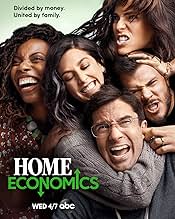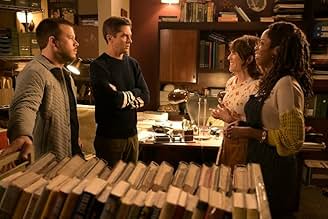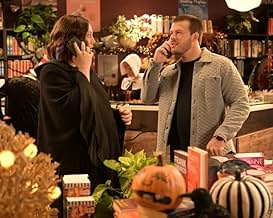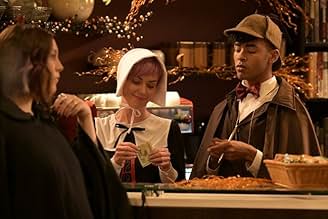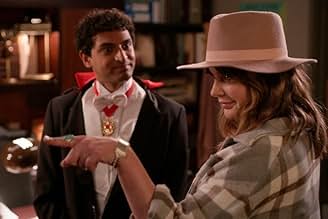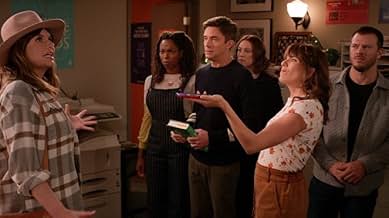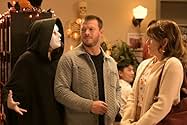Tre fratelli adulti si ritrovano a vivere a livelli di sicurezza finanziaria molto diversi l'uno dall'altro.Tre fratelli adulti si ritrovano a vivere a livelli di sicurezza finanziaria molto diversi l'uno dall'altro.Tre fratelli adulti si ritrovano a vivere a livelli di sicurezza finanziaria molto diversi l'uno dall'altro.
- Premi
- 4 candidature totali
Sfoglia gli episodi
Recensioni in evidenza
Mostly an effort to fill the safe family programming hole left by "Modern Family" except this is a bit more generationally horizontal than vertical. The series centers on the lives of three adult siblings whose kids are roughly the same age. Their parents (Nora Dunn and Richard Kind) make occasional appearances but are safely in recurring guest star territory while the kids are about as important to the formula as "Everybody Loves Raymond": Screen time is doled out to them if it helps develop one of their parents' arcs. Frankly, they could have recast the kids in between episodes and I wouldn't have noticed.
On to the roll call! Jimmy Tatro plays a well-off financial trader who's a bit difficult to buy considering this actor has appeared quite convincingly in a number of dim guys (from my small sampling). Topher Grace plays a novelist with a bit of neuroticism. Their sister, played by Caitlin McGee, is a lesbian who casually spouts off terms like male privilege and microaggressions. All three are married and all three have kids. The spouses are pretty disposable except Saturday Night Live alum Sasheer Zamata pops up as Caitlin McGee's other half. Way to bounce back, Sasheer!
As a 30-something with no kids and wife (and highly self-conscious about it), I started the show thinking "what's in it for me?" until I started to see how well the show poked at the thin veneer of marital bliss.
Within a couple episodes, Tatro's character gets divorced. In one episode, it's revealed that neither Topher Grace nor his wife have any ability to attract the opposite sex anymore. As for McGee's holier-than-thou wokeness, the show does an excellent line of lampooning her occasional moments of self-righteousness without ever showing her beliefs to be unworthy.
The show might not be ambitious, but it's disarming and has the potential to be consistent entertainment.
On to the roll call! Jimmy Tatro plays a well-off financial trader who's a bit difficult to buy considering this actor has appeared quite convincingly in a number of dim guys (from my small sampling). Topher Grace plays a novelist with a bit of neuroticism. Their sister, played by Caitlin McGee, is a lesbian who casually spouts off terms like male privilege and microaggressions. All three are married and all three have kids. The spouses are pretty disposable except Saturday Night Live alum Sasheer Zamata pops up as Caitlin McGee's other half. Way to bounce back, Sasheer!
As a 30-something with no kids and wife (and highly self-conscious about it), I started the show thinking "what's in it for me?" until I started to see how well the show poked at the thin veneer of marital bliss.
Within a couple episodes, Tatro's character gets divorced. In one episode, it's revealed that neither Topher Grace nor his wife have any ability to attract the opposite sex anymore. As for McGee's holier-than-thou wokeness, the show does an excellent line of lampooning her occasional moments of self-righteousness without ever showing her beliefs to be unworthy.
The show might not be ambitious, but it's disarming and has the potential to be consistent entertainment.
Not bad at all so far. I've always liked Topher Grace and good to see him on a sitcom for the first time since That 70s Show. Acting is pretty good throughout and the comedy doesn't seem too forced. I'll be watching more!
I like it, the actors are pretty good and likable. Topher needs to stop with the stupid clumsy acts. They look so scripted and it doesn't work. He doesn't have the comedic timing that the other brother has in his scenes. The sister is kind of annoying but comes together with her wife. I hope the show continues and grows more in-depth characters. I feel it might be the a good show in the spring lineup.
I'll give it a chance to be fine tuned over the first season because some things aren't dialed in yet. Overall though it's pretty funny if you are into dry humor.
"Home Economics" is a comedy, nothing more. It is about an extended family in which one member is financially well-off and living on a different economic plane than his siblings. This generates some friction, in part due to envy, but also because one wing of the family---the sister in a biracial lesbian relationship-rejects anything on its face that appears to be un-woke.
This is where I think some reviewers misunderstand the series. It is not about promoting wokism; some of its best jokes are stabs at the virtue signaling, hypocrisy and idiocy that comes with some ultra-progressive dogma. When they talk about the pronouns for a pet, you know they know what the real joke is.
Some of the humor might be termed intersectional. Not in the sense that the term is used by progressives, but in terms of the intersection of various doctrines that contradict each other. So you have a scene where the sister is called out for pitting her own feminist ideology against her professed belief that women (and girls) should be supported in their endeavors.
These jabs are not dwelt on. They pass quickly in the course of normal conversation, making them even more impactful.
Like most comedies, the quality of the show depends primarily on its characters. The ensemble nature of this show makes all the characters important, but some carry the load of the humor. And the cast is committed to the humor. The writing is also essential. Though this is not on the same level as "Frasier" or "Modern Family" and thus does not deserve a "10", it deserves more than the "1" that some reviewers have doled out.
At this point, I am content with the balance of the humor---willing to skewer the rich brother or the virtuously poorer members in equal measure.
This is where I think some reviewers misunderstand the series. It is not about promoting wokism; some of its best jokes are stabs at the virtue signaling, hypocrisy and idiocy that comes with some ultra-progressive dogma. When they talk about the pronouns for a pet, you know they know what the real joke is.
Some of the humor might be termed intersectional. Not in the sense that the term is used by progressives, but in terms of the intersection of various doctrines that contradict each other. So you have a scene where the sister is called out for pitting her own feminist ideology against her professed belief that women (and girls) should be supported in their endeavors.
These jabs are not dwelt on. They pass quickly in the course of normal conversation, making them even more impactful.
Like most comedies, the quality of the show depends primarily on its characters. The ensemble nature of this show makes all the characters important, but some carry the load of the humor. And the cast is committed to the humor. The writing is also essential. Though this is not on the same level as "Frasier" or "Modern Family" and thus does not deserve a "10", it deserves more than the "1" that some reviewers have doled out.
At this point, I am content with the balance of the humor---willing to skewer the rich brother or the virtuously poorer members in equal measure.
Lo sapevi?
- QuizAccording to Topher Grace, Lisa Kudrow turned down a part on the show.
- ConnessioniFeatured in MsMojo: Top 10 Modern Sitcoms You Should Be Watching (2023)
I più visti
Accedi per valutare e creare un elenco di titoli salvati per ottenere consigli personalizzati
- How many seasons does Home Economics have?Powered by Alexa
Dettagli
- Data di uscita
- Paese di origine
- Siti ufficiali
- Lingua
- Celebre anche come
- Home Economics
- Luoghi delle riprese
- Aziende produttrici
- Vedi altri crediti dell’azienda su IMDbPro
Contribuisci a questa pagina
Suggerisci una modifica o aggiungi i contenuti mancanti



